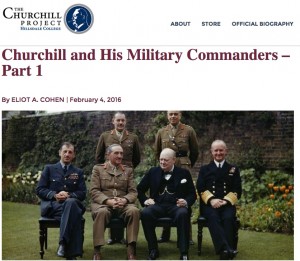“Churchill and his Military Commanders”
Part I: “War Statesmanship,” in “Churchill and his Military Commanders,” by Eliot A. Cohen. Read in full on the Hillsdale College Churchill Project.
 “The generals had in mind a concept of civil-military relations to which many still, amazingly, pay lip service: a world in which civilians provide resources, set goals, and step out of the way to let professionals do their work. War statesmanship, in Churchill’s view, focused at the apex of government an array of considerations and calculations that even those one rung down could not fully fathom.”
“The generals had in mind a concept of civil-military relations to which many still, amazingly, pay lip service: a world in which civilians provide resources, set goals, and step out of the way to let professionals do their work. War statesmanship, in Churchill’s view, focused at the apex of government an array of considerations and calculations that even those one rung down could not fully fathom.”
Eliot A. Cohen is professor of strategic studies at Johns Hopkins School of Advanced International Studies, and has served as Counselor of the Department of State. He is the author of the prize-winning book Supreme Command: Soldiers, Statesmen, and Leadership in Wartime (2002).
Excerpt: The Military Critics
“Sir Geoffrey Elton wrote: ‘There are times when I incline to judge all historians by their opinion of Winston Churchill: whether they can see that, no matter how much better the details, often damaging, of man and career become known, he still remains, quite simply, a great man.’
“Judged by Elton’s standards, many contemporary historians fail. For the last several decades, Churchill’s war leadership has come under increasingly severe attack, particularly in certain savage and perverse biographies.
“The spate of criticism represents merely one of several waves of postwar attacks on Churchill as warlord. The first surge of criticism came primarily from military authors, in particular Churchill’s own chairman of the Chiefs of Staff, and Chief of the Imperial General Staff, Alan Brooke.
“In his first published work, Brooke withheld some of the more pointed criticisms of the Prime Minister, which he often wrote after late-night arguments with Churchill. If anything, his anger grew as the war went on. Others expressed themselves in language more temperate, but had, one suspects, no less severe opinions.
“Norman Brook, secretary of the Cabinet under Churchill, wrote to Hastings Ismay, the former secretary to the Chiefs of Staff, a revealing observation: ‘Churchill has said to me, in private conversation, that this increased civilian authority was partly due to the extent to which the Generals had been discredited in the First War—which meant that, in the Second War, their successors could not pretend to be professionally infallible.’”






